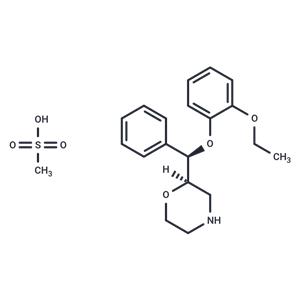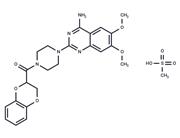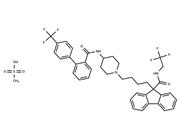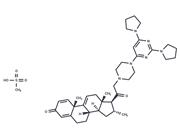| Name | Reboxetine mesylate |
| Description | Reboxetine mesylate (FCE20124 mesylate) is a norepinephrine reuptake inhibitor with a Ki of 8.2 nM. |
| In vitro | Reboxetine dose-dependently and completely inhibits [3H]-dopamine uptake to the human norepinephrine transporters (hNET) with Ki value of 11 nM in Madin–Darby canine kidney (MDCK) cells. [1] |
| In vivo | Reboxetine dose-dependently and potently inhibits locus coeruleus neuronal firing in rats with ED50 of 191 μg/kg. Reboxetine inhibition of the locus coeruleus neurons is reversible by the α2 antagonist piperoxan (1.5 mg/kg, IV). Reboxetine dose-dependently reverses reserpine-induced blepharospasm and hypothermia in the mouse. Reboxetine is also found to antagonize clonidine-induced hypothermia dose-dependently in mice. Reboxetine reverses reserpine-induced blepharospasm and hypothermia in rats with ED50 of 10 mg/kg and 3 mg/kg (p.o.), respectively. [1] Reboxetine results in a significant reduction in the mean number of panic attacks and phobic symptoms in patients with DSM-III-R panic disorder. Reboxetine also results in improvement in Hamilton Rating Scale for Depression, Hopkins Symptom Checklist-90, and Sheehan Disability Scale scores. [2] Reboxetine is associated with a markedly lower relapse rate than placebo (22% vs. 56%) and a greater cumulative probability of a maintained response during long-term treatment in patients with recurrent DSM-III-R major depression. Reboxetine effectively prevents recurrence of depressive symptoms following episode resolution. [3] Acute systemic administration of Reboxetine (0.3 mg/kg-20 mg/kg) dose-dependently increases extracellular norepinephrine in the rat frontal cortex while having no effect on extracellular serotonin. Reboxetine (20 mg/kg) also increases extracellular dopamine in the rat frontal cortex. Chronic administration of Reboxetine for 14 days results in elevated basal concentrations of extracellular norepinephrine and dopamine and a greater net increase of extracellular norepinephrine and dopamine, but not serotonin in the rat frontal cortex. [4] Reboxetine dose dependently decreases nicotine self-administration by ~60%. Repeated administration of Reboxetine (5.6 mg/kg) decreases nicotine self-administration and sucrose-maintained responding across the 14 sessions. [5] |
| Storage | Powder: -20°C for 3 years | In solvent: -80°C for 1 year | Shipping with blue ice/Shipping at ambient temperature. |
| Solubility Information | H2O : 20.5 mg/mL (50.06 mM), Sonication is recommended.
10% DMSO+40% PEG300+5% Tween 80+45% Saline : 5 mg/mL (12.21 mM), Sonication is recommended.
DMSO : 45 mg/mL (109.89 mM), Sonication is recommended.
|
| Keywords | Reboxetine mesylate | Reboxetine Mesylate | Reboxetine | PNU155950E Mesylate | PNU155950E | panic | norepinephrine reuptake | Inhibitor | inhibit | FCE-20124 Mesylate | FCE20124 Mesylate | FCE-20124 | FCE20124 | FCE 20124 Mesylate | FCE 20124 | disorder | depression | Beta Receptor | antidepressant | AdrenergicReceptor | Adrenergic Receptor | activity |
| Inhibitors Related | Olanzapine | Mirtazapine | Octopamine hydrochloride | Gemfibrozil | Buflomedil hydrochloride | Dexmedetomidine hydrochloride | Phenylephrine hydrochloride | Amitriptyline hydrochloride | Isoprenaline hydrochloride | Trazodone hydrochloride | Mianserin hydrochloride | Doxepin hydrochloride |
| Related Compound Libraries | Failed Clinical Trials Compound Library | Bioactive Compound Library | Anti-Neurodegenerative Disease Compound Library | Membrane Protein-targeted Compound Library | EMA Approved Drug Library | Anti-Cancer Clinical Compound Library | Drug Repurposing Compound Library | Inhibitor Library | Anti-Cancer Approved Drug Library | Bioactive Compounds Library Max | GPCR Compound Library | Anti-Cancer Drug Library |

 United States
United States






